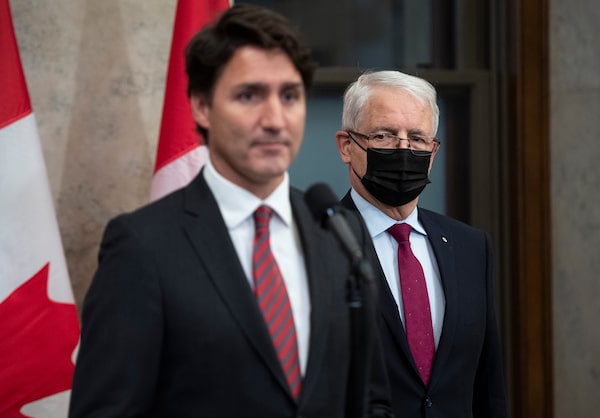
Marc Garneau is reportedly being moved out of the foreign affairs post after less than a year in the job.Justin Tang/The Canadian Press
Prime Minister Justin Trudeau has decided to appoint his fifth minister of foreign affairs, which is a travesty.
My colleagues Bill Curry, Marieke Walsh and Steven Chase report that Marc Garneau is being moved out of the post after less than a year in the job. Serial rotation of foreign affairs ministers is nothing new. But five in six years? That’s just ridiculous.
Mr. Garneau – who succeeded François-Philippe Champagne, Chrystia Freeland and Stéphane Dion – was one of the more capable ministers in the Liberal cabinet. But he had a reputation for resisting dictates from officials in the Prime Minister’s Office, which is highly career-limiting in this government. And as a 72-year-old white male, Mr. Garneau contributed nothing to the diversity quotient on the Liberal front bench.
It’s also true that being foreign affairs minister, or fisheries minister, or natural resources minister, or just about any other minister doesn’t mean much any more. The age of ministers ended years ago. Jean Chrétien was the last prime minister who allowed and expected his ministers to run their departments.
His successors have had one or two cabinet colleagues they trusted and respected: Jim Flaherty, in Stephen Harper’s case; Ms. Freeland and Dominic LeBlanc, in Mr. Trudeau’s. The Finance Minister continues to have power, and one or two other ministers may have enough clout to more or less run their departments. The rest are kept on a very short leash. Everything you need to know about the new cabinet came a month ago when Mr. Trudeau announced that Ms. Freeland would stay on as Finance Minister and Deputy Prime Minister – details about the rest of cabinet to follow.
But though true government-by-cabinet is unlikely ever to return, one department other than Finance needs a truly powerful minister, able to reform the department itself, chart a course on policy and convince the prime minister to accept that course. That department is Foreign Affairs.
The Western consensus is failing. The Donald Trump wing of the Republican Party threatens American democracy. China grows more belligerent, while Russia makes more mischief. Hungary and Poland challenge the European Union’s feeble efforts to punish their retreat from democracy. Freedom has been in decline around the world for 15 straight years, according to Freedom House, an NGO that monitors democratic governments around the world. And even as countries make fresh commitments to reduce carbon emissions in advance of COP26 in Glasgow, emissions continue to increase.
Canada’s response to a world in which, to borrow from Robert Kagan, the jungle is growing back, has been timid, despite Mr. Trudeau’s declaration when he became Prime Minister that “Canada is back.” There were successes in the first term: airlifting Syrian refugees, ratifying European and Pacific trade agreements, protecting NAFTA from Mr. Trump. But the second term was hijacked by the Meng Wanzhou/Two Michaels affair. And six years in, failures – to win a seat on the Security Council, to renew peacekeeping, to deepen ties with India, to establish a consistent approach to China – outnumber successes.
“Trudeau and team aspire to be reformists on a grand scale,” Mr. Chrétien writes in his new book. But “their lack of experience for succeeding in that the goal is more and more apparent.”
The United States, Great Britain and Australia signed a new defence pact without Canada’s participation. The Americans are pushing for an expensive renewal of NORAD, but Canada doesn’t have the money. (Defence policy is as incoherent as foreign policy.)
The best way to forge a response to all of this would be to appoint a powerful minister of foreign affairs: somebody with the depth of experience to thoroughly overhaul the department, to thoroughly review and reform Canadian foreign policy and then to implement that policy, with the full backing of the Prime Minister.
A few names come to mind: former ambassador to the United States David MacNaughton; former Bank of Canada and Bank of England governor Mark Carney; former McKinsey managing director and current Chinese ambassador Dominic Barton; within cabinet, Mr. LeBlanc. These are the sort of people who could convince others at home and abroad that, when they speak, the Prime Minister is also speaking.
That is what the country’s foreign policy needs. Instead, we are likely to get more of the same under the next foreign minister, whoever that is, as if anybody cared.
For subscribers: Get exclusive political news and analysis by signing up for the Politics Briefing.